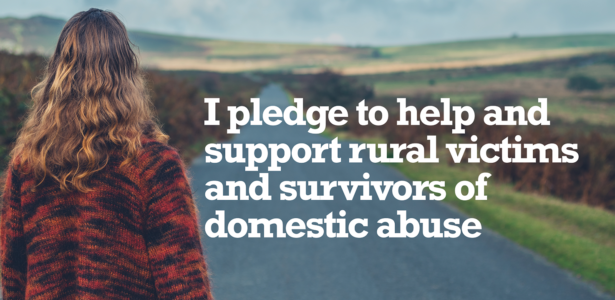Captive & Controlled: The hidden scandal of domestic abuse in rural areas

The results of an 18-month intensive research project, the study has analysed available evidence, spoken in depth to victims of abuse, assessed local support services and looked at the approach of the police.
Its findings are stark, disturbing and lead to an urgent call for action from government, the police, society and us all.
Among the ten key conclusions:
- Domestic abuse lasts, on average, 25% longer in most rural areas – the report finds that exiting abuse is harder, takes longer and is more complex for rural victims as there are significant additional barriers in rural communities compared to urban areas.
- Rurality and isolation are used as a weapon by abusers – we now have clear evidence that abusers specifically move victims to rural settings to further isolate them, or systematically use the isolation to their advantage should they already be there. It not only facilitates abusers controlling their victims whilst in the relationship but makes it harder for victims to escape that abuse. Physical isolation is the arguably the best weapon an abuser has; and has a profound impact on making the victim feel quite literally captive.
- Close-knit rural communities facilitate abuse – strong community spirit is one of the joys of rural life, but it can be equally powerful in keeping domestic abuse hidden and in facilitating abuse – not knowingly, not willingly, but by virtue of the way communities are in rural Britain.
- The policing response is largely inadequate – whilst the service provided by the police is improving, feedback from victims shows the response in rural areas is not as good as that in urban areas. Some of this is due to a lack of female police officers being available in rural areas, as well as fewer officers with appropriate domestic abuse training. And the further the victim from a visible police presence (i.e. building) the less likely they are to call the police.
- Support services are scarce – less available, less visible and less effective – victims were clear that domestic abuse support services are much harder to find and much harder to engage with than in an urban setting. These services are also less effective in supporting rural victims and survivors once they manage to make contact.
All ten conclusions, and the full research which led to them, can be found at www.ruralabuse.co.uk. They will be revealed at the launch in The House of Parliament on Wednesday 17 July when Victims Minister Edward Argar MP will introduce the report and a panel of experts will discuss how to change things for the future.
Research for the report took place across the country, with a particular focus and in-depth analysis of seven policing areas – County Durham, Derbyshire, Devon and Cornwall, Dorset, Lincolnshire, North Yorkshire and Nottinghamshire. Within these areas, 67 victims took part and gave their accounts of their abuse, its impact and how it was dealt with.
Many of their harrowing stories can be found in the full report in their own words, including:
“You think that the community in villages like the one I lived in would be a source of support but in reality, no-one wants to get involved in another person’s personal life… because he played for the village cricket team he had the support of everyone and this made me feel even more isolated.”
“I found it so hard to find anyone in the village to talk to. They are all perfectly nice people on the surface, but after he shouted at me in the pub that night it was like everyone took a step back from me.”
“My partner used to deliberately drive off to work with the kids car seats in his car which meant I could not go anywhere safely because I was stuck in the cottage with the kids… it was just another way he isolated me and kept me from interacting with anyone else”
“Once I came in and he had wrapped up a new phone for me… when I opened it up it had all been set up for me but all the pictures from my old phone and my friend’s numbers weren’t on there. Like none of them. When I asked for my old phone to transfer them over he said he had destroyed it because everything I needed was on the new phone… it was like he had removed my former life – just wiped it clean.”
“You don’t really have a choice – the police are at least an hour away and if it happens on a Friday or Saturday night, which it always did, they are busy dealing with other things. I never really considered calling the police – what’s the point? By that time, I had been hit, slapped or punched anyway.”
The National Rural Crime Network today issues six recommendations and calls for them to be acted on as soon as possible:
- FOR GOVERNMENT – Government must apply its ‘rural proofing’ policy to domestic abuse, strengthening its commitment with a new duty on policy makers, commissioners and service providers to account for the specific needs of victims and survivors in rural communities
- FOR THE POLICE – Chief Constables need to urgently assess and improve their service provision in rural areas
- FOR SUPPORT SERVICES AND CHARITIES – support services, and those who commission them, must improve their offer to rural victims and survivors
- FOR COMMISSIONERS – commissioners (in all their forms) need to collaborate more and provide simpler, more secure and longer-term funding
- FOR THE SECTOR – Government, policing and service providers must collectively commit to redressing the urban bias
- FOR SOCIETY – Challenge the status quo and societal ‘norms’ in rural communities to redress inequality between women and men.
Julia Mulligan, Chair of the National Rural Crime Network and North Yorkshire Police, Fire and Crime Commissioner, said:
“This report is clear – domestic abuse is hidden under our noses, hidden by abusers who like to keep it that way and on a scale of abuse hitherto unseen.
“All parties with a duty to help victims; the police, support services, charities, Police and Crime Commissioners, health services, and many others, need to understand that we have missed this. We have let victims and survivors down. We have collectively failed. We need to put that right. And for all of that, let me be the first to apologise to those we have failed.
“This report has been over a year in the making. I have spoken to many people about the emerging themes and everyone has nodded and said, yes we know there is domestic abuse in rural areas, yes we know there are problems for victims. But now, with the publication of this report – the first ever to look at domestic abuse specifically through the lens of rurality – its scale and nature is starkly exposed for the first time. Nodding and promising to carry on much as we do now is not good enough.
“This report must surely be a catalyst to help us better protect the women, children and men in rural communities who suffer daily at the hands of calculating, manipulating, controlling and violent abusers.”
The full report can be seen and downloaded at www.ruralabuse.co.uk.
